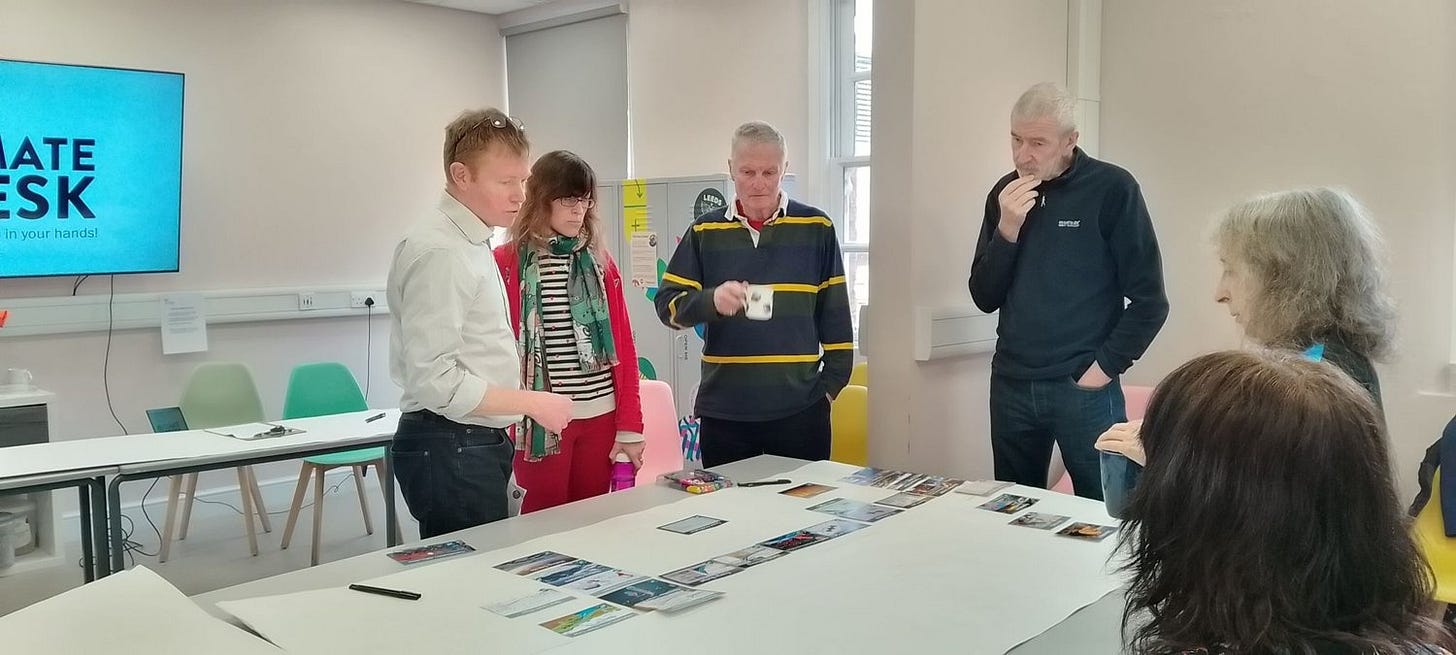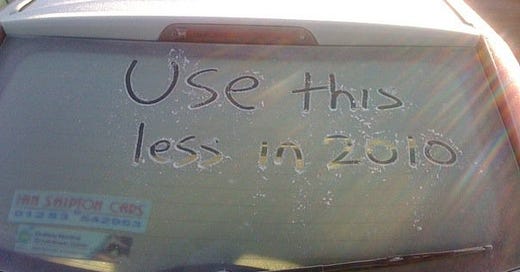The Social Business #59
Reflections on nine years living without owning a car (and now owning one again). And why stopping cows burping so much matters - a lot.
On 1 January 2010, in an icy Premier Inn car park in north Manchester, I made this new year’s resolution.
I pledged this as part of a campaign by Possible - which encouraged people and organisations to reduce their carbon emissions by 10% in 2010.
My knowledge of what we need to do to tackle the climate crisis was a bit more limited back then, but I knew that how we get around was a significant source of carbon emissions.

That year, we kept a travel diary, and tried to make conscious decisions about how to make our journeys - rather than just routinely jumping in the car.
So for longer journeys we took the train more than we’d done before. For journeys in Leeds, we didn’t always get the bus - but we did that more than before. And my bike saw more use that it had for a while.
We did that for 18 months - and then in Autumn 2011 we reckoned we could live without owning a car. So we said goodbye to the Ford Focus - and embarked on what turned out to be nearly nine years of living without a car on the drive.
Nine years not owning a car
We still got around by car a fair bit during those nine years. But much less than we did before - and by hiring cars when needed, rather than owning one.
And there’s a good chance we still wouldn’t own a car - but the pandemic happened.
Public transport became problematic - and the cost of car rentals shot up. So reluctantly in Summer 2020 we bought a car again - and we still have it.
I’d love to get rid of it again.
How can we build a future where we don’t need to own a car?
Our years not owning a car came to mind again when I heard about the INFUZE (Inspiring Futures For Zero Carbon Mobility) project led by the University of Leeds.
This podcast, featuring 3 of the academics involved in the project, gives a good overview of the project.
I like the sound of the project - and its focus on working with people - over time - to explore what it might take for them to one day live without owning a car.
There are lots of very understandable reasons why many of us can’t imagine a future where we didn’t own a car - and it’s important to understand them, respect them, and to invite people to imagine how things could be different.
The point about time is a key one for me. It was 18 months after that new year’s resolution when we chose to sell our car. Change takes time. So the focus on working with local communities in Leeds - over time - is very welcome.
I can’t get over how much it costs to own a car.
Now that we own a car again, the thing that strikes me more than anything is how normal it’s become to spend such a significant part of our incomes on owning and running a car. I’m the kind of guy who keeps the receipts…. and I know that we spent a lot less on travel in the years we didn’t own a car.
I think there’ll be lots of interesting things to explore in this project - in terms of what needs to change - both individually and as a city - if we’re to become a city where it’s a realistic option for more people not to own a car. And wider recognition of how much of the money people earn just drains out of the city to finance companies, oil firms and car companies - for “assets” that sit idle for 95% of the time - might well be one thing that encourages more of us that it’s time for a rethink.

A few other things from this week
I enjoyed this film on Netflix - based on the true story of William Kamkwamba - a teenager in Malawi who built a windmill to pump water to irrigate crops in his community amidst regular crop failures - inspired by something he’d read in a school library book.
Meanwhile, on the Farming Today podcast earlier this week, I heard about the social media controversy around an additive that’s being added to the feed of some dairy cows to reduce the amount of methane that they belch out.
Thanks to my recent deletion of my Twitter account (a decision that feels better by the day) I hadn’t heard anything about this prior to hearing about it on the podcast.
From what I’ve read and heard, (including this), I have no reason to believe that this is anything but a good step forward in reducing one very significant source of methane - a particularly potent greenhouse gas.
But for me it’s another reminder of how dangerous so much of social media has become. Who knows, maybe there’s something to be concerned about here - although on balance I tend to trust the scientists in the 68 countries where this has been declared safe.
One thing I do know is that we need to significantly reduce emissions that are causing global heating - and methane from burping cows is a significant source of those emissions.
I learnt this by attending a Climate Fresk workshop - a workshop that I’m now trained to facilitate.
The world feels really complicated right now - and this is just yet one more example. But improving our knowledge - of those old fashioned things called facts - is one way to help make sense of things.
If you’d like to improve your own knowledge of the causes of global heating and what we can do about it, why not go along to a Climate Fresk workshop - there’s a list of upcoming workshops on their website - or talk with me about facilitating one for you.

And finally, one from the archive…
We need to talk about travel
If you've chatted with friends or family about how we can respond to the climate crisis - or if exploring this kind of thing is something you do in your job - you'll be familiar with having uncomfortable conversations about travel.





